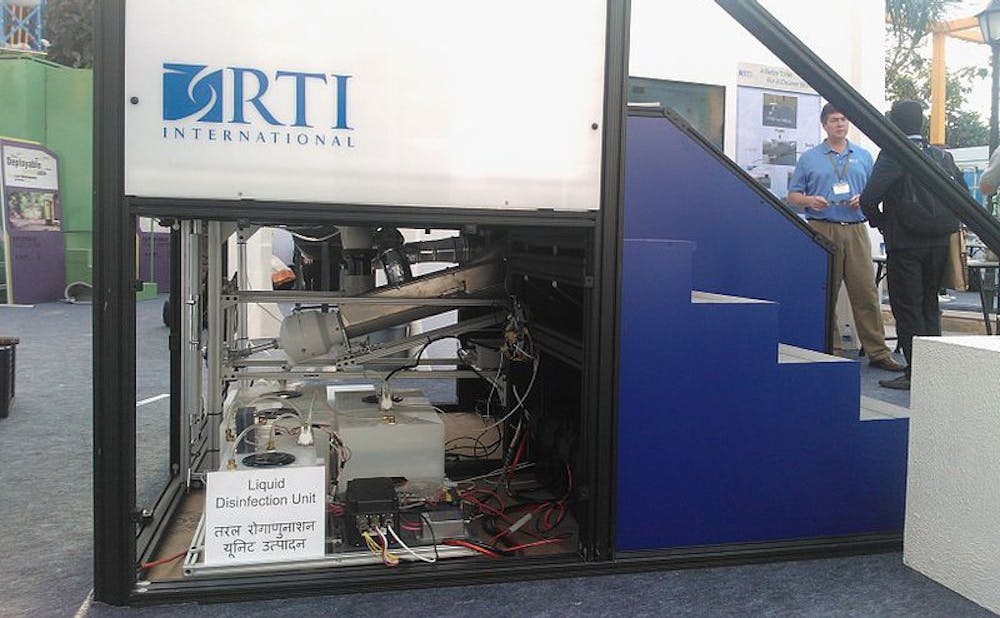One thing that unites people around the globe? We all have to use the toilet. But in some countries, waste management is more of a challenge than in others.
Duke researchers recently installed the first experimental "reinvented toilet" at a textile mill in Coimbatore, India, as part of the Bill and Melinda Gates Foundation's Reinvent the Toilet Challenge. This toilet is part of a decentralized waste processing system that can reuse water, which is helpful in areas with frequent droughts. It works using energy from solar panels, reducing power needs.
“[Poor sanitation] is an epidemic that affects the poorest of the poor who live in an area that cannot afford treatment,” said Brian Stoner, research professor in the department of electrical and computer engineering, who began the project.
Launched in 2011, the Reinvent the Toilet Challenge aims to create solutions for the estimated 2.5 billion people who don’t have affordable sanitation systems. This is especially important for women, who are disproportionately affected by poor sanitation options.
“This is really an amazingly important area that only in the last 10 years has become in the public eye,” said Jeffrey Glass, professor of electrical and computer engineering and a project co-leader.
The researchers were assisted in their project by Namrata Jha, the Bangalore-based director of Duke University India, who helped foster their partnership with the textile mill. They began by surveying more than 2,000 households to understand the social needs involved in sanitation, finding that the facility would need to be safe but also have a comforting look.
The team then spent time in labs at Duke and RTI International, a non-profit organization based in the Research Triangle, developing a prototype. The toilet operates through a corkscrew conveyor belt that separates liquid and solid waste. The solid waste is dried and then burned as fuel, which can be used to further power the toilet and disinfect the liquid waste. After being disinfected, the liquid waste can be reused for flushing the toilet or safely disposed.
The prototype was first sent to CEPT University in Ahmedabad, India, for testing before being installed in Coimbatore, where it will operate for a full year.
Throughout the testing, the researchers hope to gain information about how the community responds to the toilet system. The women at the textile mill will be able to choose between the regular toilet facilities and this new system. Their feedback will be useful in designing future interactions to best suit women’s needs and wants.
“It’s a prototype toilet, so we’re learning what things need to be changed, and then we’ll feed those back into the engineering team,” Glass said.
He explained that this work is important because providing better sanitation options can prevent people from getting sick and make them more industrious, positively impacting their economies.
“For every dollar we spend on sanitation, the return on investment is extremely high,” he said. “There are people who can’t work and become productive members of community because of sickness.”
Women also suffer more than men when proper sanitation options are not available because of cultural norms, Stoner noted. He said there are parts of the world where open defecation is the only option, but women are not supposed to expose themselves openly.
“Women and girls are persecuted if they bare themselves in public,” Stoner said. “They have to go out early in morning or late in the evening and open themselves up to everything from harassment to sexual assault.”
The project leaders are also trying to find the best way to dispose of women’s menstruation products, which could prevent them from having to stay home from work or school when menstruating.
“If girls have access to a safe sanitation solution in their schools, they are much less likely to drop out of school,” Stoner said.
In the future, the scientists hope to partner with manufacturers who can turn the toilet into a commercial product. They’ve already teamed up with sanitation technology company Biomass Controls, which is based in Connecticut but has a Durham office, to help them with field trials.
Soon, the team will launch another toilet in South Africa. They will also present their technology at a showcase event in Beijing, China this fall.
“I expect we will expand number of prototypes, and with each prototype, we’ll make improvements and enhancements,” Glass said.
Get The Chronicle straight to your inbox
Sign up for our weekly newsletter. Cancel at any time.

